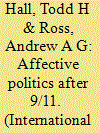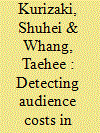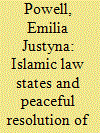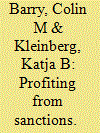|
|
|
Sort Order |
|
|
|
Items / Page
|
|
|
|
|
|
|
| Srl | Item |
| 1 |
ID:
146143


|
|
|
|
|
| Summary/Abstract |
Affect and emotion are key elements of our lived experience as human beings but currently play little role in how we theorize actorhood in international relations. We offer six amendments for integrating affective dynamics into existing conceptions of individual-level actorhood in IR. From these amendments emerge the theoretical micro-foundations upon which we build propositions concerning potential collective-level affective dynamics and political strategies. We illustrate the analytical payoff of our proposals by examining the aftermath of the terrorist attacks on 11 September 2001. By amending existing understandings of actorhood to include human affective experience, we can integrate and make sense of a variety of psychological, social, and political consequences stemming from the attacks, both within the United States and internationally.
|
|
|
|
|
|
|
|
|
|
|
|
|
|
|
|
| 2 |
ID:
146146


|
|
|
|
|
| Summary/Abstract |
Selection effects in crisis bargaining make it difficult to directly measure audience costs because state leaders have an incentive to avoid incurring audience costs. We overcome this inferential problem of selection bias by using a structural statistical model. This approach allows us to estimate the size of audience costs, both incurred and not incurred, in international crises. We show that although audience costs exist for state leaders of various regime types, democratic leaders face larger audience costs than nondemocratic leaders do. Audience costs can be so large that war might be preferable to concessions, especially for leaders of highly democratic states. Audience costs also increase a state's bargaining leverage in crises because the target state is more likely to acquiesce if the challenge carries larger audience costs. We also find evidence that audience costs generate selection effects.
|
|
|
|
|
|
|
|
|
|
|
|
|
|
|
|
| 3 |
ID:
146142


|
|
|
|
|
| Summary/Abstract |
Contemporaries and historians often blame the errors and tragedies of US policy during the Cold War on a dominant narrative of national security: the “Cold War consensus.” Its usual periodization, according to which it came together in the late 1940s and persisted until the late 1960s when it unraveled amidst the trauma of the Vietnam War, fits well with a common theory of change in ideas and discourse. That theory expects stasis until a substantial unexpected failure (in this domain, military defeat) discredits dominant ideas and unsettles dominant coalitions. However, systematic data reveal the standard history of this important case to be wrong. Based on a large-scale content analysis of newspaper editorials on foreign affairs, this article shows that the Cold War narrative was narrower than conventional accounts suggest, that it did not coalesce until well into the 1950s, and that it began to erode even before the Vietnam War's Americanization in 1965. To make sense of this puzzle, I develop an alternative theory of the rise and fall of the narratives that underpin and structure debate over national security. Rooted in the dynamics of public narrative and the domestic politics of the battlefield, the theory argues that military failure impedes change in the narrative in whose terms government officials had legitimated the mission, whereas victory creates the opportunity for departures from the dominant narrative. Process-tracing reveals causal dynamics consistent with the theory: failure in the Korean War, which might have undermined Cold War globalism, instead facilitated the Cold War narrative's rise to dominance (or consensus); and the triumph of the Cuban Missile Crisis made possible that dominant narrative's breakdown before the upheaval of Vietnam. This hard and important case suggests the need to rethink the relationship between success, failure, and change in dominant narratives of national security—and perhaps in other policy domains as well.
|
|
|
|
|
|
|
|
|
|
|
|
|
|
|
|
| 4 |
ID:
146145


|
|
|
|
|
| Summary/Abstract |
We apply insights from “new, new” trade theory to explain a puzzling decline in US firm antidumping (AD) filings in an era of persistent foreign currency undervaluations and increasing import competition. Firms exhibit heterogeneity both within and across industries regarding foreign direct investment (FDI). We propose that firms making vertical or resource-seeking investments abroad will be less likely to file AD petitions, and firms are likely to undertake vertical FDI in the context of currency undervaluation. Hence, we argue, the increasing vertical FDI of US firms makes trade disputes far less likely. We use firm-level data to examine the universe of US manufacturing firms and find that AD filers generally conduct no intrafirm trade with filed-against countries. We also find that persistent currency undervaluation is associated over time with increased vertical FDI and intrafirm trade by US multinational corporations (MNCs) in the undervaluing country. Among larger US MNCs, the likelihood of an AD filing is negatively associated with increases in intrafirm trade. In the context of currency undervaluation, we confirm the existing finding that undervaluation is associated with more AD filings. We also find, however, that high levels of intrafirm imports from countries with undervalued currencies significantly decrease the likelihood of AD filings. Our study highlights the centrality of firm heterogeneity in international trade and investment in understanding political mobilization over international economic policy.
|
|
|
|
|
|
|
|
|
|
|
|
|
|
|
|
| 5 |
ID:
146141


|
|
|
|
|
| Summary/Abstract |
This article argues that specific characteristics of the domestic legal institutions of Islamic law states shape these states' choices of peaceful resolution methods in territorial disputes. After providing original data on the characteristics of Islamic legal structures, I systematically compare pertinent rules of international dispute resolution methods and Islamic law. I demonstrate empirically that not all Islamic law states view international settlement venues in the same way. Secular legal features, such as constitutional mentions of education, supreme court, or peaceful settlement of disputes have the power to attract these states to the most formal international venues—arbitration and adjudication. On the other hand, Islamic law states whose legal system is infused with Islamic religious precepts are attracted to less-formalized venues.
|
|
|
|
|
|
|
|
|
|
|
|
|
|
|
|
| 6 |
ID:
146147


|
|
|
|
|
| Summary/Abstract |
Recent research has highlighted combat's positive effects for political behavior, but it is unclear whether they extend to attitudes toward the conflict itself. We exploit the assignment of health rankings determining combat eligibility in the Israel Defense Forces to examine the effect of combat exposure on support for peaceful conflict resolution. Given the centrality of the Israeli-Palestinian conflict to global affairs, and its apparent intractability, the political consequences of combat become all the more pressing. We find that exposure to combat hardens attitudes toward the rival and reduces support for negotiation and compromise. Importantly, these attitudes translate into voting behavior: combatants are likely to vote for more hawkish parties. These findings call for caution in emphasizing the benign effects of combat and underscore the importance of reintegrating combatants during the transition from conflict to peace.
|
|
|
|
|
|
|
|
|
|
|
|
|
|
|
|
| 7 |
ID:
146144


|
|
|
|
|
| Summary/Abstract |
Scholarship on the determinants of foreign direct investment (FDI) flows has produced valuable insights into the role of host state characteristics and home-host relations. This study draws attention to another factor in investment decisions—the political and economic relations that home and host states maintain with third-party states. More narrowly, we focus on how investors respond to their home-state's imposition of economic sanctions against a trading partner. Greater economic integration has allowed states to use economic sanctions more frequently in recent decades. At the same time, economic sanctions are thought to have a distorting effect on global trade and financial flows as firms and governments adjust to new constraints. We argue that as firms at home in the sanctioning state respond to coercive measures against a trading partner by looking for alternative sources of profit, they will shift investments to states that can provide indirect access to the sanctioned economy. In particular, those states that are perceived as prospective sanctions-busters—major trading partners of the sanctions target or states with a history of sanctions-busting behavior—will benefit disproportionately from the misfortune of others. We test this conjecture using data on US economic sanctions and global flows of US FDI from 1966 to 2000. The findings reveal that investor decision making in part responds to political developments beyond the home-host dyad.
|
|
|
|
|
|
|
|
|
|
|
|
|
|
|
|
|
|
|
|
|